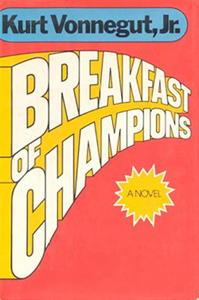My library has most of Kurt Vonnegut’s catalog, all of them tattered, dog-eared and much-enjoyed. He’s a popular book club choice, but also, people of all (or no) political persuasions like to go back to him. Among his most famous works is “Breakfast of Champions” (1973), which captures the absurdities of human (and particularly American) existence at the end of the Vietnam War and the Gold Standard, while also showing how the absurd past led to this point, and how the absurd future will continue it.
He uses the phrase “And so on” to close many segments, similar to his own and Philip K. Dick’s “So it goes” from other novels. In his introduction to this, his seventh, book, Vonnegut confesses to being mentally exhausted by cynicism but he has to get one last novel of this type out of his system. So while we follow clear through-lines for sad-sack pulp novelist Kilgore Trout and sad-sack Midland City business magnate Dwayne Hoover, “Breakfast of Champions” also operates as Vonnegut’s diary.
***
The author doesn’t heavily intrude on the novel, even though he himself is a character and Trout is his blatant alter ego, eight years before PKD would include both himself and alter ego Horselover Fat in “VALIS.” PKD examines the supernatural human condition in the massive universe whereas Vonnegut examines the workaday human condition on puny Earth.

“Breakfast of Champions, or Goodbye Blue Monday” (1973)
Author: Kurt Vonnegut
Genre: Social satire
Setting: Midland City, Ohio; 1973
Note to readers: The Book Club Book Report series features books I’m reading for my book club, Brilliant Bookworms.
(But that’s a superficial distinction. At one point, Vonnegut includes a joke about a man who checks out several space-alien novels from a library and returns them in disgust, saying that he already knows all about humans.)
Vonnegut acts as an omniscient narrator, and only actively joins the story late in the game, as Trout and Hoover are on the verge of meeting each other by twist of fate at a Midland City art convention. Vonnegut offers insight into the writing process here and there, like when he wonders if he has logically given Trout enough time to get from New York City to Ohio. He admonishes himself to let it go.
***
Another reason for the much-loved state of Vonnegut novels is that they are read by all ages. Teens won’t get everything; 20-somethings will find his observations eye-opening; middle-aged people will get everything but will enjoy the humor and creativity. While we may get everything, of course we can still struggle over Vonnegut’s thesis statement, one that parallels George Carlin’s realization that for his mental health he must view human existence as a comedy.

In chapter 10, hitchhiker Trout is chatting with a trucker taking him to the arts convention, where he’s to be the guest of honor:
“I can’t tell if you’re serious or not,” said the driver.
“I won’t know myself until I find out whether life is serious or not,” said Trout. “It’s dangerous, I know, and it can hurt a lot. That doesn’t necessarily mean it’s serious, too.”
The one age group “Breakfast of Champions” is not for is little kids, yet – as if he’s writing a kids’ book — Vonnegut includes robust illustrations of objects he’s discussing, from underwear to the U.S. flag to a vagina. The illustrations encourage us to think of these things as if they are brand-new and thus realize that the human condition is always childish.
***
Another structural oddity: Vonnegut tells a flowing narrative, but breaks it up with three-dot section dividers. In most books, these would indicate we’re switching from Trout to Hoover, but in “Breakfast,” we stay within the same flow. It’s only with chapter breaks that we switch characters.
These three-dot breakers make Trout’s and Hoover’s lives into a series of absurdist vignettes, but we aren’t missing anything in between. We get the steady progression of Trout’s nonsensical but literal journey from hack writer to celebrity and Hoover’s total psychological collapse into unhinged violence, but we feel like we’re reading light vignettes. This helps to preserve the comedy as tragedy encroaches.
***
Also, it allows for true sidebars (often told by characters in the main characters’ journeys) that illustrate wider atrocities in history. Vonnegut’s politics are statist but with disdain for the majority of state behaviors. He doesn’t address his internal inconsistencies, but he likewise isn’t dodgy.
For instance, Lincoln in this narrative is wholly defined as the heroic president who freed the slaves, but at the same time a major side character is Wayne Hoobler. Descended from slaves who were thrown into freedom with no money or education or sense of American culture, Hoobler is released from prison and wants a job where he can prove himself via hard work.
(Hoobler is also bombarded with racism, and Vonnegut bombards readers with the N-word. I get the sense that this is for the sake of bombardment of the absurdity of racism, rather than the author’s unadulterated hatred for black people.)
No such job is available to Wayne, so he hangs out between the cars at Hoover’s sales lot (the similarity to his own name is what draws him) and mumbles to himself about the traffic on the thoroughfare. His story goes nowhere, which is the point.
***
Because we start to realize the lack of a sane destination is the point of “Breakfast,” the last quarter of the book isn’t as good as the buildup. Vonnegut strains to achieve sadness after he has established that Trout, Hoover, Hoobler, etc., have no tears left to give. After convincingly painting a thoroughly tragi-comic world, one where he describes every man’s penis length and girth and every woman’s bust and waist dimensions, it’s hard to land the tragedy.
Still, “Breakfast of Champions” was the world humans lived in in 1973. And so on.

